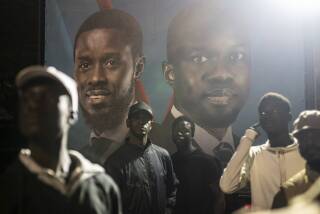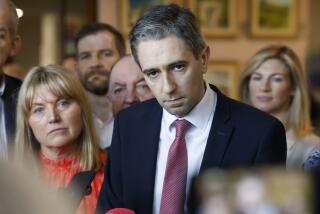France’s Socialists have a candidate
France’s Socialist Party selected a 57-year-old National Assembly deputy nicknamed “Monsieur Normal” to go head-to-head with beleaguered incumbent Nicolas Sarkozy in next year’s presidential election.
Francois Hollande won a convincing victory in a primary runoff Sunday against Martine Aubry, a former Labor minister.
In his victory speech, Hollande said he was well aware of the “heavy and serious job” ahead of him as he seeks to unify the French left in order to bring it its first presidency for nearly 17 years.
“I note this evening’s result with pride and responsibility,” said Hollande, who leans slightly to the right of his party. “I want to revive the French dream.”
At the same time, Sarkozy is deeply unpopular, according to polls. Although his approval rating has improved from a low of 30% in April, a recent survey showed 63% did not approve of his performance.
Pollsters attributed the increase in Sarkozy’s popularity to his high-profile role in helping oust longtime Libyan leader Moammar Kadafi.
After conceding defeat, Aubry, 61, the head of the Socialist Party, told supporters: “Francois Holland is now our candidate.... From now on he will symbolize the hope of Socialists and the left. Now is the time for unity.”
Early figures gave Hollande a large majority with about 56% of the votes compared with 43% for Aubry. It was the first time any French political party has held primary elections to select a presidential candidate.
Hollande, speaking at the Socialist Party’s headquarters in Paris, extended an olive branch to his five rivals in last Sunday’s initial primary vote — including Segolene Royal, his former partner and mother of his four children. All but one of the defeated first-round candidates rallied behind Hollande for the second-round vote.
“I need a Socialist Party that shows solidarity. I want to be the candidate for respect, for dialogue, for democracy. The right has nothing else to lose except what it values most ... power,” he said. “I cannot fight alone. I need unity, I need us to gather together, I need a solid party. I am a man of unity and I have shown this.”
Hollande had polled 9 percentage points ahead of Aubry in the first round of the presidential election last Sunday, for which more than 2.5 million voters turned out. The runoff was needed because neither candidate received 50% of that vote.
But as the election was open to all voters on the electoral lists, not just members of the Socialist Party, the result was impossible to predict.
Afterward, Royal, who was the party’s unsuccessful candidate for the 2007 presidential election, added her congratulations.
The primary was a “great success,” she said. “Now is the time for union and unity.”
Until May, when then-front-runner Dominique Strauss-Kahn was arrested in New York on sexual assault charges involving a hotel maid, nobody had given either Hollande or Aubry much chance of becoming a presidential candidate.
Hollande, also known as “L’Homme Tranquille” (The Quiet Man), had a reputation of being warm, witty and clever, but was never seen as a presidential contender within the party. Aubry, meanwhile, had reportedly struck a deal with Strauss-Kahn not to challenge him for the party’s nomination.
As the Strauss-Kahn scandal unfolded, Hollande underwent a makeover, losing weight and throwing out his crumpled suits and horn-rimmed spectacles.
Although the charges against Strauss-Kahn were dropped, he returned to Paris with his reputation and political career in tatters, opening the way for other candidates to step into the breach.
Willsher is a special correspondent.
More to Read
Start your day right
Sign up for Essential California for news, features and recommendations from the L.A. Times and beyond in your inbox six days a week.
You may occasionally receive promotional content from the Los Angeles Times.





